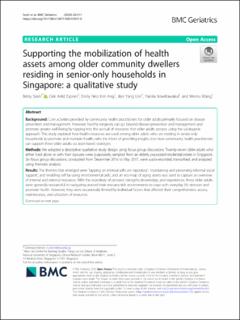| dc.description.abstract | Background
Care activities provided by community health practitioners for older adults primarily focused on disease prevention and management. However, healthy longevity can go beyond disease prevention and management and promote greater well-being by tapping into the accrual of resources that older adults possess using the salutogenic approach. This study explored how health resources are used among older adults who are residing in senior-only households to promote and maintain health, with the intent of providing insights into how community health practitioners can support these older adults via asset-based strategies.
Methods
We adopted a descriptive qualitative study design using focus group discussions. Twenty-seven older adults who either lived alone or with their spouses were purposively sampled from an elderly populated residential estate in Singapore. Six focus group discussions, conducted from December 2016 to May 2017, were audio-recorded, transcribed, and analyzed using thematic analysis.
Results
The themes that emerged were ‘tapping on internal self-care repository’, ‘maintaining and preserving informal social support’, and ‘enabling self by using environmental aids’, and an eco-map of aging assets was used to capture an overview of internal and external resources. With the repository of personal strengths, knowledge, and experiences, these older adults were generally resourceful in navigating around their resource-rich environments to cope with everyday life stressors and promote health. However, they were occasionally limited by individual factors that affected their comprehension, access, maintenance, and utilization of resources.
Conclusion
The eco-map of aging assets can be used as an assessment framework by community health practitioners to recognize, consider, and build a repertoire of resources among these older adults. It serves as a gentle reminder to adopt an ecological approach in considering and tapping into older adults’ wide-ranging personal, social, and environmental resources. Community health practitioners can support resource integration as resource facilitators via cognitive, behavioral, and motivational salutogenic pathways to overcome resource mobilization barriers faced by older adults. Such an approach helps older adults to find their internal capabilities and abilities to know who, where, what, and how to seek external resources to identify solutions, creating the intrinsic value to sustain their actions on resource utility. | en_US |

